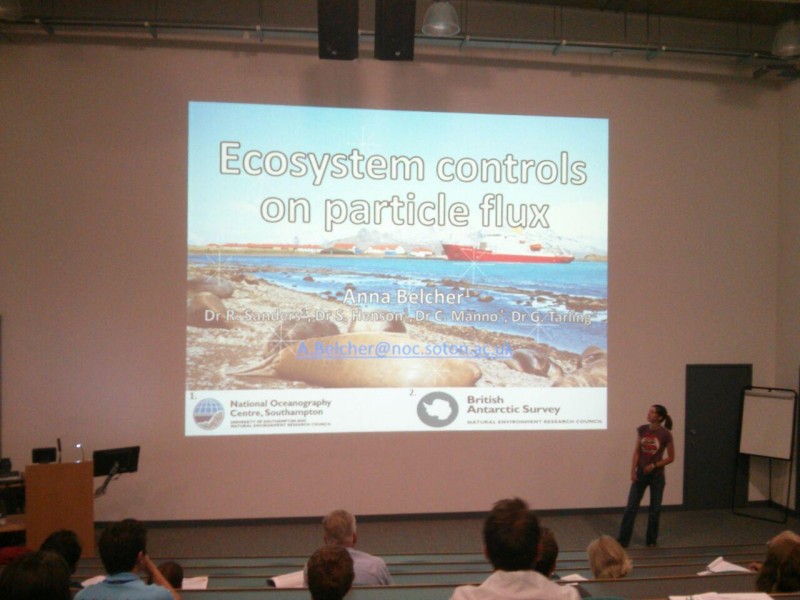Challenger Society 2014 conference in Plymouth
Anna Belcher
National Oceanography Centre Southampton

Challenger Society 2014 conference in Plymouth
I would like to thank the Challenger Society for supporting my attendance of the Challenger Society 2014 conference in Plymouth. There were over 300 scientists from all over the country and it provided a good opportunity for PhD and early career researchers to present their work in a friendly environment and to meet some of the top scientists in the field.
Challenger 2014 provided a great setting for my first oral presentation at a scientific conference, and it was an excellent opportunity to meet more of the scientific community and discuss my research with those working in similar fields. I presented in the Biogeochemical Cycles session, talking about the role of ecosystem structure and zooplankton behaviour on particle flux. Despite being a bit nervous about presenting to a large audience, I think the talk went well and I had some interesting discussions afterwards, giving me some new ideas to further progress my work.
Over the four days there were a large number of sessions covering a broad range of topics which was great for keeping me up to date with current research across other oceanographic fields. The marine policy session was particularly engaging and, I think, provided plenty of food for thought as to how important it is to ensure that our research is relevant to policy. The conference hosted some very interesting keynote speakers and a thought provoking evening lecture by Chief Scientific Advisor to DEFRA, Ian Boyd. There was also a careers workshop, providing some great advice as to some of the possible careers after a PhD both academic and non academic.
Thank you again for not only hosting a fantastic conference, but also for providing me with a Travel Award to support my attendance. I am already looking forward to Challenger 2016!
Profile
Anna Belcher is a biogeochemical oceanographer currently investigating the role of ecosystem structure and zooplankton behaviour on the particulate flux of carbon in the ocean. She is just coming to the end of the first year of her PhD and currently investigating the role of diel vertical migration on short term changes in the particle flux, particularly focussed on the Southern Ocean. Anna will be returning to the Scotia Sea, Antarctica later this year to collect more data and hopefully provide more of an insight into the spatial and temporal variability in carbon flux.
In 2010, Anna completed a four year undergraduate Masters degree in Oceanography at the University of Southampton, spending the third year at the University of Washington, Seattle. After a year off to do some travelling and exploring of the world, Anna spent two years working as an Oceanographic Surveyor in South Wales for Titan Environmental Surveys. She then returned to research, assisting with a number of research cruises before starting her PhD at the National Oceanography Centre, Southampton.
Latest News
Royal Society Publishing Photography Competition 2025
Please see a message from the Royal Society below:
We are delighted to announce that the 2025 Competition is now open for entries until 15 August for a chance to win £1000! The competition celebrates the power of photography in conveying the wonder of science happening all around us and photographs can be submitted in the categories of: Astronomy, Behaviour, Earth Science and Climatology, Ecology and Environmental Science, and Microimaging.
The competition is free to enter and open to anyone studying or working in science at graduate level or above. Category winners will receive a one-year membership to the Royal Photographic Society and the overall winner will receive a grand prize of £1,000. Find out more: https://bit.ly/RSPphotocomp
October 2025 MEDIN Workshop: Marine Data Management, Governance and the MEDIN toolset
The Marine Environmental Data and Information Network (MEDIN) are pleased to announce that registration is now open for the next occurrence of our popular free online training workshop: ‘Marine Data Management, Governance and the MEDIN toolset’ on the 13th – 17th October 2025 on OceanTeacher Global Academy.
Marine Data Management, Governance and the MEDIN toolset
The Marine Environmental Data and Information Network (MEDIN) and OceanWise are delighted to invite you to attend our popular free online training workshop: ‘Marine Data Management, Governance and the MEDIN toolset’ on the 19th – 23rd of May 2025.
